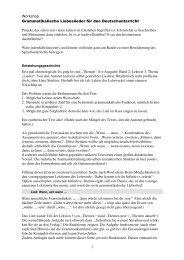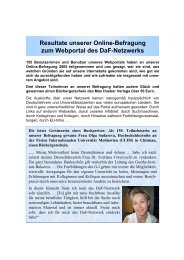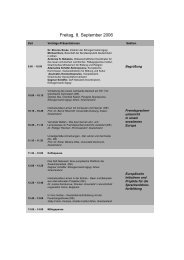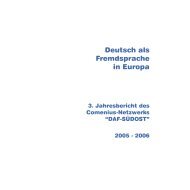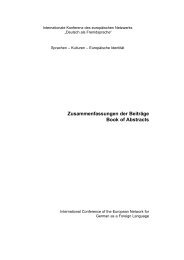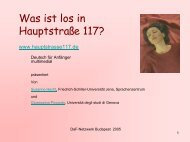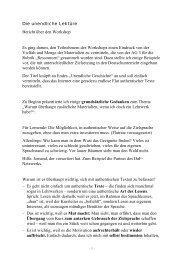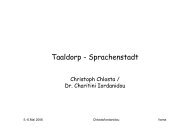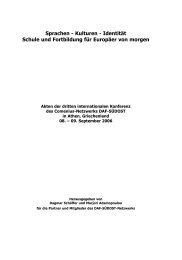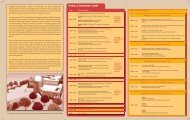Fremdsprache Deutsch Europäisch - DaF Netzwerk
Fremdsprache Deutsch Europäisch - DaF Netzwerk
Fremdsprache Deutsch Europäisch - DaF Netzwerk
Erfolgreiche ePaper selbst erstellen
Machen Sie aus Ihren PDF Publikationen ein blätterbares Flipbook mit unserer einzigartigen Google optimierten e-Paper Software.
II. Internationale Konferenz des <strong>DaF</strong>-<strong>Netzwerk</strong>s<br />
educational and motivational aspects in this respect are Vogel (2001) who states that ’… The<br />
problem of teaching intercultural communication in the classroom is that it almost impossible<br />
to model experiential learning in role-plays. Students who have not experienced the difficulties<br />
in co-operation with people from other cultures usually do not see the need for this type of<br />
exercise. Internet projects where they have to co-operate, to work on a common goal with learners<br />
from other cultures could eventually replace role-plays and give the students the chance to<br />
experience authentic co-operation. And Kees de Bot quoted in (Marsh, 2002:.31) 8 , indicating<br />
that for many students speaking a foreign language in a setting where all interactants share the<br />
same mother tongue is still awkward and unnatural: ‘ Only through international activities for<br />
which the foreign language needs to be used on a daily basis in natural conversational (including<br />
virtual / internet based) settings can the students be intrinsically motivated to keep using<br />
the language in the school setting.’<br />
Seen in a wider perspective this approach would be in line with trends in education in general<br />
where the importance of development of attitudes and competences relevant for professional<br />
life and global citizenship is stressed (e.g. intercultural understanding, collaboration skills, multiliteracies)<br />
(Working Group ‘ICT in Education and Training’, Progress Report 2003)<br />
Supported by recent studies (e.g. ICC, 2003) Fitzpatrick (2003) concludes in his article in which he<br />
pleads for ‘ a shift in emphasis in future training of teachers from learning to use to using to learn.’:<br />
‘ … Perhaps the chief challenge for us today is to provide learners with approaches which<br />
prepare them for the future use of media, linking the use in institutional contexts to more<br />
individual applications which harness the diversity of ICT to authentic, real-world encounters<br />
with a target language and culture.’<br />
2. The MICaLL Project: Design principles and development<br />
2.1. Pedagogical and didactical approaches<br />
As indicated above project models and materials are needed to support a Teacher Education<br />
pedagogical approach which allows experiential learning for (student) teachers.<br />
Tasks and activities will be designed that will involve all participants in practical experiences<br />
with forms of networked language learning and teaching.<br />
Participants will be introduced to the new learning environment and related collaborative<br />
processes by carrying out collective pilots. A ‘blended learning’ model is envisaged where<br />
local, teacher educator led f2f sessions are combined with independent e-learning activities<br />
and peer-to-peer student events such as participation in international LanguageQuest-teams<br />
or shared blogwriting.<br />
The module content production will be based both on selecting and remodelling available<br />
relevant practice reports, research results and guide lines (cf. inter alia Linthout, 2004: 123-140)<br />
and the evaluation of experiments focussing on task design for and management of pilots<br />
using LanguageQuest, Chat, WebLog, Wiki and e-Tandem. Validation of module content<br />
will be based on practice based activities by project team members and participants of the<br />
in-service course projects. In line with educational views on participatory roles for students in<br />
higher education (Collis & Moonen, 2001; HvU Education & ICT knowledge platform, 2003)<br />
student teachers will be involved in the developmental process.<br />
8 This study (Marsh, 2002) is about the relevance of innovation of modern language education for the<br />
development of the European community by the introduction of Content and Language Integrated<br />
Learning (CLIL).<br />
145



